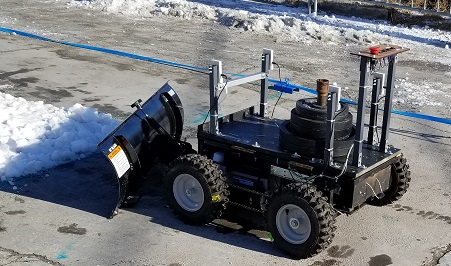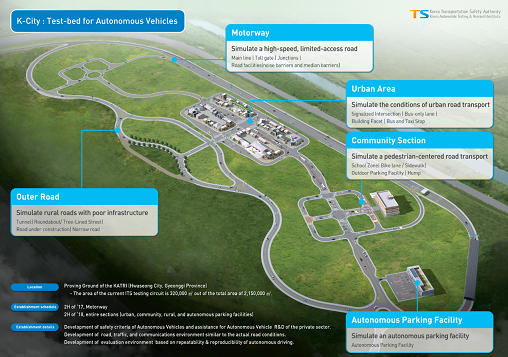|
AV Update
|
|
From the Editors Last month, we listed the top 10 AV-related news items as seen through our Canadian lens. This month, we are going to predict the 10 AV events of 2019 -- again as seen through our Canadian eyes. Some of these are certain to happen and others are a bit more speculative.
Canadian AV News
On Saturday January 26, 2019, the Minnesota Chapter of AUVSI held a student automated snow plow competition in downtown Toronto. Sidewalk Labs was a sponsor and hosted the event at their Sidewalk Toronto site. Barrie Kirk assisted at the event and reports that it was both very interesting and informative. It was great to see all the students from seven US teams face real-world challenges in a fun and educational event. Here is one of the snow plows about to start its run: 
It is well-known that shared mobility is closely
linked to AVs. MOVMI -- based in Vancouver
-- has published its 2019 Shared Mobility City
Index (SMCI) edition. This provides a
comprehensive overview of shared mobility
infrastructure and policy in 20 North American
cities and ranks them against their peers. Each
city is marked using five different criteria,
commuting patterns (25%), city sustainability
vision and plans (25%), shared mobility providers
(15%), public to private cost comparison (10%) and
city density (5%).
This link provides an interactive map which
tells you if your city placed in the top twenty.
There is also information on how to order the full
report.
In collaboration with Pacific Western and other partners, the City of Calgary undertook a self-driving shuttle project in September 2018. Nearly 4,500 people rode the shuttle (dubbed ELA) during its 3 weeks of operation. 250 of the riders completed a post-ride survey conducted by the University of Calgary. Of these, 41% said they would not ride such a shuttle on a regular freeway, 25% said they would and 34% were undecided. More people (70%) felt comfortable if the shuttle had its own dedicated lane versus 55% on a regular, low-traffic road. More information at this link. On a related topic, Pacific Western will be doing more demonstration projects with ELA in Vancouver and Surrey in February 2019. This is part of the two cities’ joint entry in the Smart City Challenge, a federal competition with a $50 million prize aimed at fostering innovation in municipalities. More information at this link. International AV News The new startup Pronto.ai launched by Anthony Levandowski claims to have driven the longest route in the U.S. in a self-driving mode. The trip occurred October 26-30, 2018 in a Toyota Prius from San Francisco to New York City over a distance of 4,987 Km. The self-drive technology for Pronto.ai is mainly based on cameras (no LiDAR). The company hopes to sell its technology to trucking companies at a cost of $5,000 per installation. More information is at this link. Wired magazine published an article on December 25, 2018 titled ‘DON’T ASK WHEN SELF-DRIVING CARS WILL ARRIVE - ASK WHERE’. The article posits that self-driving car trials have been mostly conducted in areas more conducive to such trials, such as Arizona, Florida or Nevada. These locales side step more challenging situations such as having to deal with snow, rain, sand, hail, sun glare, etc. In the words of the CEO of one self-driving firm: “you can drive for miles and avoid complex lane merges—or even traffic lights! “. The article can be viewed at this link. Another op-ed was in Jalopnik and was titled ‘2018 Was a Hard Reality Check for Autonomous Cars’ details some of the major challenges and controversies faced by companies and individuals engaged in developing self-driving technologies. Depending on who you choose to believe, mass scale self-drive technology could be here in a few years or it could be decades away. The article can be viewed at this link. With US$10 million funding from the South Korean Government, what is claimed to be the world’s largest test bed for self-driving cars has been created in that country. The test bed called ‘K-City’ is located about an hour south of Seoul on a 90-acre site (see map). South Korean firms such as Samsung, SK Telecom, Kia Motors and Hyundai will be using this facility to develop and test their connected and autonomous vehicles. More information at this link.  (Editor's note: Fact checking is becoming more common, so we should point our that the new Ottawa AV test track is 1,860 acres, which is 20 times the size of the South Korean site.) A recent study by Michigan State University says that the algorithms behind computer vision systems can be seriously hampered by inclement weather such as rain. These computer vision systems are heavily used in self-driving cars for detecting objects, recognizing toad signs and the colour of traffic lights. The study states that computer vision algorithms failed to detect about 20 percent of objects in light rain. The failure rate doubled when rain intensity was tripled. More information at this link. With the launch of Waymo’s robotaxi service (Waymo One) in Arizona in December 2018, the debate has risen again on whether there is really a viable commercial market for robotaxi services. This is despite the large sums spent by Uber, Lyft, Waymo, Ford, GM and others for developing such services. More information is at this link. McKinsey & Company has published a series of articles on technological disruptions to the trucking and logistics industries. Starting with autonomous trucks, McKinsey predicts significant change in the cost structure and utilization of trucking — and hence with the cost of consumer goods. Sixty-five percent of the America’s consumable goods are trucked to market. With full autonomy, operating costs may decline by about 45%, saving the US for-hire trucking industry $85 billion to $125 billion. The big question is how will these savings be distributed? How will shippers and carriers divide the lower costs of logistics? Or will most of the surplus move to consumers, in the form of lower prices? More information is at this link. A coalition of industry, non-profit and academic institutions has launched a campaign to inform the public and policymakers about the potential and the reality of advanced vehicle technologies and self-driving vehicles. ‘Partners for Automated Vehicle Education’ (PAVE) will hold events across the U.S. to introduce driver assistance and self-driving technology to consumers and policymakers; hold educational workshops to help federal, state and local officials make informed policy decisions. Audi of America, Toyota, VW, Daimler, Waymo, NVIDIA, SAE International, AAA and others are participating in PAVE. More information is at this link. On December 21, 2018 the U.S. Department of Transportation (USDoT) issued a ‘Notice of Funding Opportunity’ (NOFO) for $60 million in federal grant funding for projects that test the safe integration of automated driving systems (ADS). The program will cover three broad areas: Safety, Data for Safety Analysis & Rulemaking and Collaboration. Grant applications are due on March 21, 2019. More information is at this link. One of the major challenges for autonomous vehicles is the huge number of possible scenarios that an AV can encounter. Some of these scenarios are presented in Planetizen in an article titled ‘Transportation 2019—Looking Back, Looking Ahead’. The article can be read at this link. The largest autonomous vehicle test site in the U.S. – GoMentum Station, has been bought by the Northern California, Nevada and Utah chapter of the American Automobile Association (AAA) for an undisclosed sum. The site previously managed by ‘Contra Costa Transportation Authority’ and is located in Concord, California. More information at this link. A new multi-million dollar simulator facility has been built by Ansible Motion in Norfolk (UK) for testing advanced driver assistance systems (ADAS) and autonomous technologies. The system known as ‘Delta driver-in-the-loop’ (DIL) simulator is designed to offer a repeatable laboratory environment to test and validate new ADAS in a short amount of time and to see how drivers react to them. More information at this link. And finally, autonomous vehicles and vehicle technologies were a dominant theme at the 2019 Consumer Electronics Show (CES) in Las Vegas. Below is a summary of some of the more major announcements and products at this year’s show:
Upcoming AV-Related Events February 13-14, 2019: Autonomous Industrial Vehicle Technology Conference, Cologne, Germany Feb 28 – March 1, 2019: Operational Safe Systems for Level 5 Automation (OSS5), South San Francisco Conference Centre April 8-9, 2019: Autonomous & Connected Vehicle Europe 2019, Berlin, Germany April 28 – May 1, 2019: IEEE Vehicular Technology Conference, Kuala Lumpur, Malaysia May 8-9, 2019: IoT613 Conference, Gatineau, Quebec May 21-23, 2019: Autonomous Vehicle Test & Development Symposium Europe, Stuttgart, Germany
June 2-5, 2019:
Canadian Institute of Transportation Engineers (CITE)
annual conference at the Westin hotel in Ottawa June 25-27, 2019: Autonomous Ship Technology Symposium, Amsterdam, Netherlands
Sept 9-10, 2019:
CAV Canada 2019, a national CAV conference
organized by the Kanata North Business Association,
Invest Ottawa and the Canadian Automated Vehicles
Institute (CAVI); Brookstreet Hotel, Ottawa Sept 22-25, 2019: IEEE Vehicular Technology Conference, Honolulu, Hawaii
October 2019:
World Congress and Challenge for Self-Driving Transport,
Dubai, UAE |
|
AV Update
is a free, monthly roundup of news and analysis in the world
of automated vehicles and their impact on all levels of
government and the private sector. 300 Earl Grey Drive, Suite 222, Ottawa ON K2T 1C1, Canada. info@cavcoe.com www.cavcoe.com |